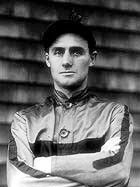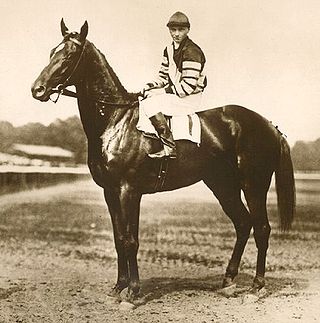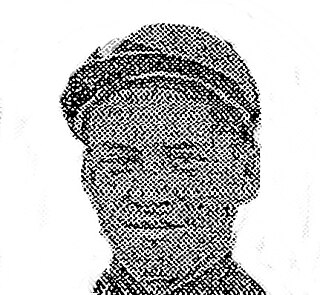
Theodore Frederick Atkinson was a Canadian-born American thoroughbred horse racing jockey, inducted into the National Museum of Racing and Hall of Fame in 1957.

John Patrick Loftus was an American thoroughbred horse racing Hall of Fame jockey.
Braulio Baeza is an American Thoroughbred horse racing Hall of Fame jockey and one of the master Thoroughbred jockeys of our time. In 1963, he was the first Latin American jockey to win the Kentucky Derby. Baeza began his racing career in 1955 in Panama at Hipodromo Juan Franco, and in March 1960, was invited to Miami, Florida to ride under contract for Owner/Trainer, Fred Hooper. He rode his first race in the US in the first race on Keeneland's opening day, 1960, and won it on Foolish Youth.

Frederick J. Taral was an American Hall of Fame jockey.
Alfred Masson Robertson was a Hall of Fame jockey in American Thoroughbred horse racing.

Joseph A. Notter was an American Hall of Fame Champion jockey and winner of two of the American Classic Races.

James H. "Jimmy" Butwell was an American Racing Hall of Fame jockey. His birth year placed at the Family Search.org website is stated as 1896. However, although there were no child labor laws in the United States, it seems unlikely that he would have been a professional jockey at age twelve. A Michigan native, before his successful time riding in the New York City area, Jimmy Butwell began his career at small race tracks in Nebraska and Colorado. Butwell rode for several prominent owners and in 1912, a year he led all North American riders in earnings, he rode Monocacy to victory for Harry Payne Whitney in the Victoria Stakes at Woodbine Racetrack in Toronto, Ontario, Canada. Of his four mounts in the Kentucky Derby, Butwell's best finish was third in the 1915 running. He won the 1913 Preakness Stakes and captured the 1910 Belmont Stakes and the 1917 Belmont Stakes. In 1920 Butwell had more race wins than any jockey in the United States and the following year rode Herendesy to victory in Canada's most prestigious race, the King's Plate.

Carroll Hugh "Cal" Shilling (1885–1950) was an American Thoroughbred horse racing Hall of Fame jockey. In his 1926 autobiography, The Spell of the Turf, Hall of Fame trainer Sam Hildreth wrote that Shilling was the greatest rider he ever saw.

Clarence Joseph Kummer was a U.S. Racing Hall of Fame jockey who won four American Classic Races.
Colonel Holloway was an American Thoroughbred racehorse best known for winning the 1912 Preakness Stakes.

In the United States, the Triple Crown of Thoroughbred Racing, commonly known as the Triple Crown, is a series of horse races for three-year-old Thoroughbreds, consisting of the Kentucky Derby, Preakness Stakes, and Belmont Stakes. The three races were inaugurated in different years, the last being the Kentucky Derby in 1875. The Triple Crown Trophy, commissioned in 1950 but awarded to all previous winners as well as those after 1950, is awarded to a horse who wins all three races and is thereafter designated as a Triple Crown winner. The races are traditionally run in May and early June of each year, although global events have resulted in schedule adjustments, such as in 1945 and 2020.
Glen Eldon Nelson was an American jockey in the sport of Thoroughbred horse racing who competed primarily at tracks on the East Coast of the United States and who is best known for winning the 1972 Preakness Stakes.

Eddie Dugan was a jockey in Thoroughbred horse racing who won three American Classic Races and two Canadian Classic Races. In addition, Dugan raced and won in Russian Empire.

William "Smokey" Saunders was a Canadian Horse Racing Hall of Fame jockey in Thoroughbred horse racing and won the United States Triple Crown of Thoroughbred Racing on Omaha in 1935. News reports in Saunders’ lifetime used both the nicknames “Willie” and “Smokey.”
Frank Robinson was an American Champion Thoroughbred horse racing jockey.
Leon "Buddy" Haas was a jockey in Thoroughbred horse racing who in 1941 was reported to be earning the highest salary of any jockey in the United States.
"Cowboy" Jack Leroy Kaenel is a retired American jockey in Thoroughbred racing who, at age 16, became the youngest rider to ever win the second leg of the U.S. Triple Crown series when he rode Aloma's Ruler to victory in the 1982 Preakness Stakes.
The 1928 Preakness Stakes was the 53rd running of the Preakness. The race took place on Friday, May 11, 1928, eight days before the Kentucky Derby making it the first leg of the U.S. Triple Crown series. A horse race for three-year-old thoroughbreds, it carried a total purse of $71,370. It was run on a track rated fast in a final time of 2:00 1/5. Ridden by future U.S. Racing Hall of Fame inductee Raymond Workman, Victorian won the race by a nose over runner-up Toro. Nassak, the betting favorite from the powerful Rancocas Stable finished a distant 11th. The fifth-place finisher, Sun Beau, went on to a brilliant racing career and was voted U.S. Champion Older Horse in three straight years culminating with his 1996 induction into the U.S. National Museum of Racing and Hall of Fame.

Samuel Jesse Doggett was one of the leading American Thoroughbred horse racing jockeys of the 1890s and a founding director of the Horsemen's Protective Association who went on to train and own racehorses.
William J. Donohue was a jockey, trainer and owner of Thoroughbred racehorses who competed in his native Canada as well as the United States where he won each of the three races that would become the U. S. Triple Crown series.










